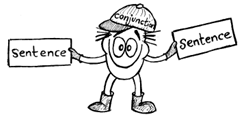
Lesson 16: Conjunctions
In this section, we will be discussing the conjunctions and how they’re used in a sentence.
Objectives:
- To define conjunctions
- To enumerate the different ways in which different conjunctions are used
- To identify the different kinds of conjunctions
Quick Navigation through the Lesson 16:
 Conjunctions are crucial in the English language because they provide a good transition for both words and ideas in our work. Furthermore, they define how those phrases, clauses or ideas relate with one another: are they similar? Are they different? In this lesson, we’ll be talking about conjunctions and their different uses. We’ll also be demonstrating each means of use in a sentence.
Conjunctions are crucial in the English language because they provide a good transition for both words and ideas in our work. Furthermore, they define how those phrases, clauses or ideas relate with one another: are they similar? Are they different? In this lesson, we’ll be talking about conjunctions and their different uses. We’ll also be demonstrating each means of use in a sentence.
Definition
Conjunctions are words which join words, clauses, phrases and sentences.
Types & Examples
There are many different types of conjunctions—there are conjunctions which join phrases that are opposite in meaning and some which join those which mean something similar. Certain conjunctions have to be written together and others can be used alone. In this part of our lesson, we’ll be taking a look at the different types of conjunctions and how they’re used in a sentence
Coordinating Conjunctions
 Coordinating conjunctions connect words, phrases and sentences which are equivalent: they can either be similar or opposite in meaning. These include and, not, yet, but, or, so and for. Below are a couple of examples outlining the proper context in which each of these are to be used.
Coordinating conjunctions connect words, phrases and sentences which are equivalent: they can either be similar or opposite in meaning. These include and, not, yet, but, or, so and for. Below are a couple of examples outlining the proper context in which each of these are to be used.
Ex:
Jenny and Elizabeth are going to the park.
(And means “in addition to”—in this sentence, it connects the words Jenny and Elizabeth, both of which are proper nouns; this is what we mean by equivalent.)
I want to go to the concert but I don’t have money.
(But always connects two conflicting but related clauses—in this cause “I want to go to the concert” conflicts with “I don’t have money” but the two are related because without money, going to the concert won’t be possible. Yet is used similarly, although it is more formal.)
You have to pick: the red or the blue?
(Or always indicates a choice.)
I didn’t get to log in, so I didn’t get paid.
(So indicates causality of two phrases, words, clauses or sentences.)
She decided to leave him, for he was always drunk.
(For can be used as an alternative for because.)
[WpProQuiz 140]
Correlative Conjunctions
 Correlative conjunctions are conjunctions which come in pairs. These are either/or, neither/nor, both/and, and not only/but also. Below are examples of how to use these in a sentence along with the specific way in which they connect words according to meaning.
Correlative conjunctions are conjunctions which come in pairs. These are either/or, neither/nor, both/and, and not only/but also. Below are examples of how to use these in a sentence along with the specific way in which they connect words according to meaning.
Ex:
I’ll take either the big, square one or the small, round one.
(Either/or are used to denote choice.)
I like neither Luis nor Antonio.
(Neither/nor are used to denote the absence of choice.)
I like both dogs and cats.
(Both/and denotes inclusion.)
I did not only yesterday’s homework but tomorrow’s as well.
(Not only/but also denotes going past what is expected.)
[WpProQuiz 141]
Subordinating Conjunctions
Subordinating conjunctions are conjunctions which are used at the beginning of subordinate clauses or clauses which relate to the previous sentence or idea. These include but are not limited to although, because, after, before, how, if, once, since, so that, until, unless, when, while, where and whether.
Ex:
Although he loved her, he was unable to fight for her.
(Although means in spite of the fact that)
Because he wanted to leave early, he came to work early.
(Because denotes causality of actions or statements)
After your meeting, let me know if you can come over.
(After means subsequently.)
Before you go to bed, put under-eye cream to reduce wrinkles.
(Before means previous to, or previously)
Tell me how you got him to buy a dog.
(How means the manner in which)
If you could do it, would you?
(If means in the event that)
Once I was there, I just knew what to do.
(Once means at that moment)
Since I started singing, I haven’t gotten sore throat.
(Since means from a certain period in time)
So that she could keep living there, she had to get a higher paying job.
(So that means in order to)
Until he stops talking, I won’t be able to get a word in edgewise.
(Until means up until the time that)
Unless you go and finish what you’re doing, you’re not going to be able to go home.
(Unless means except, on the condition that)
When you go out, make sure to buy me some Ibuprofen.
(When means at that time)
While he’s there, make sure you ask him what he meant.
(While means during the time that)
Where there is smoke, there is fire.
(Where indicates location)
Whether you want to or not, you will have to submit the paper today.
(Whether means if it is true or not)
In this lesson, we studied all about conjunctions or connecting words. We learned about the three different types of conjunctions as well as how they’re used in sentences. We were able to discuss the different contexts in which they’re used as well as illustrate them by giving example sentences. We also learned that conjunctions are important when learning good English grammar because they provide transitions as well as provide a relationship between different phrases, clauses and sentences.
[WpProQuiz 143]
Up next we’ll be talking about conjunctive adverbs. We’ll be discussing their definition as well as their uses. And as always, we’ll be seeing how they behave in a sentence by looking at different examples.
 + 1-888-827-0150
+ 1-888-827-0150 + 44-20-3006-2750
+ 44-20-3006-2750










